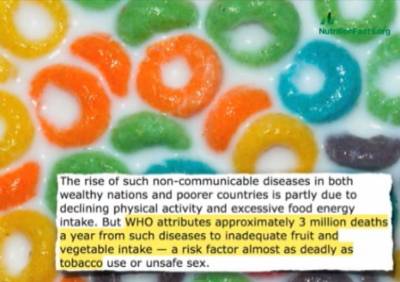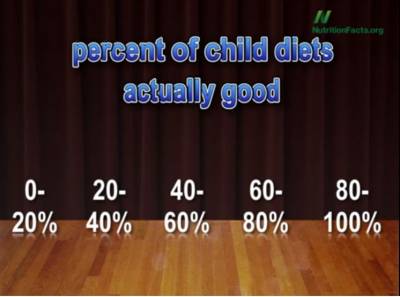The World Health Organization, (WHO) attributes over 3 million deaths per year to "inadequate fruit and vegetable intake - a risk factor almost as deadly as tobacco use or unsafe sex." Why haven't you heard this from most family physicians? You'll be surprised to find out that less than 25% of medical schools offer a single course dedicated for nutrition and some graduating physicians have had no formal nutritional training at all. Out of thousands of clinical instruction hours, some may receive as little as three hours.
DrCarney.com Blog
The "Paleo" diet or "Caveman" diet has recently become a popular diet, especially among some fitness groups such as CrossFit. The Paleo diet is a modern day diet based on the presumed ancient diet of early man during the Paleolithic Era.
There are many aspects of this diet which are health promoting, such as the addition of fruits, vegetables, and nuts and seeds. Other beneficial attributes include the avoidance of dairy products, processed snack foods, and alcohol. However, legumes, grains, and starchy vegetables have also been eliminated which are beneficial and are a significant part of a whole-food, Starch-Smart® diet. The Paleo diet centers its meals around animal products, much like the typical American diet, and is high in saturated fat and low in carbohydrates. Advocates state that the high percentage of animal products to whole plant food is a key feature of this diet with sausage, bacon, lard and tallow being acceptable.
Dr. Jay Gordon, is a pediatrician that uses whole-food, plant-based nutrition as preventative medicine in his medical practice in California. He's a nationally recognized pediatrician, nutritionist, lecturer, teacher, magazine columnist, and the author of numerous books.
We first learned of Dr. Gordon's passion regarding nutritional medicine from watching the Processed People documentary. Dr. Gordon is one of the many plant-based physicians that are featured in this documentary. The one minute video excerpt below highlights Dr. Gordon speaking about protein needs and how we don't need to consume animal products in order to be healthy. The above video clip was taken from the "Processed People" documentary.
Out of the thousands of hours that doctors receive in medical school training, you may be surprised to find out that most haven't had a single course in nutrition. Dr. Michael Greger says that, "Most medical schools in the United States fail to provide even a bare minimum of nutrition training." Due to their lack...
Dr. Joel Fuhrman has written an excellent article regarding our culture's obsession using rich, disease-promoting foods for celebrating special occasions, especially for Halloween. Dr. Fuhrman states in his article, "As parents we must protect our children from harm and give them the best opportunity in life to have a happy and healthy future. Science suggests...
One out of every six lambs raised for human consumption in the U.S. has been found to be infected with the Toxoplasma parasite. This parasite can affect the brains of humans. It is estimated that ten percent of Americans currently have these brain parasites and aren't even aware of it. Illnesses such as Parkinson's, bi-polar disorder,...
Let's pretend it's lunch time. You're in a meeting and it won't end until 2:00, two hours past the time you're used to eating. How do you feel? Are you experiencing "stomach grumbling, headaches, light-headedness, irritability, fatigue, and inability to focus?"
At 1:00, are you now hoping no one will notice your nervousness, confusion, shaking, and anxiety? Most of us would assume that these uncomfortable symptoms are associated with hunger, since eating relieves the discomfort. Dr. Joel Fuhrman explains in his article that conventional wisdom would agree these are hunger symptoms, but Dr. Fuhrman disagrees. He says, "People are consistently led by these symptoms to consume more calories than they require and this widespread overeating behavior has led to an epidemic of obesity and a continual rise in preventable chronic diseases. Understanding the motivation behind overeating behaviors could be a key factor in reversing these trends."
If you have watched the impressive Forks Over Knives documentary, then you are familiar with Dr. Matthew Lederman, one of the many plant-based doctors featured in this film. In the live-stream Q&A video below, Doctors Matthew Lederman and Alona Pulde answer viewer's questions regarding plant-based nutrition. Topics in this one-hour presentation include: protein requirements, complete...
The word "fiber" may bring many thoughts to our minds. Helping us "stay regular" would be the most prominent thought for most of us. This is certainly true; however, fiber plays a much larger role in the prevention and reversal of disease, as Dr. Neal Barnard points out in this ten minute video.
Fiber is the indigestible substance which is resistant to digestive enzymes. Its role in removing toxic waste products is an important one. Carcinogens, for example, found in meat and dairy products, are moved along more quickly when sufficient fiber is available. This shortens the time it has to damage the lining of the intestines, which helps us avoid colon cancer. This would explain one reason why colon cancer rates are much lower in those consuming a plant-based diet.
Restaurant owner, Judy Patti, prepared her meals the way most Americans do, using a vast selection of meat, dairy, eggs and oil. She admits her poor dietary choices were the root cause of her illness. Judy was 60 pounds overweight, had high blood pressure, and had already undergone two coronary bypass surgeries in the past. Her...
Parents make many choices throughout the day concerning the health and safety of their children. Adequate sleep, proper dental hygiene, and getting enough fresh air and exercise are just a few of the many good habits we instill in our children. When it comes to dietary choices, how are parents doing?
Studies continue to demonstrate potential health risks associated with eating animal products, as shown below - written by the Physician's Committee for Responsible Medicine. (PCRM)
"Red and processed meat products increase women's disease risk, according to a study published in the American Journal of Clinical Nutrition. Researchers from Harvard analyzed the diets and blood of 3,690 participants from the Nurses' Health Study and found that as total red meat consumption increased, C-reactive protein (CRP, a biomarker of infections and diseases including heart disease and cancer), hemoglobin A1c (an indicator of diabetes risk), and stored iron (a mineral which in excess is associated with heart disease, cancer, and diabetes) also increased. Weight and calorie intake also increased with increased intake of red and processed meat products."
"Consumption of red and processed meat products is associated with increased risk of death, according to a new review published by the American Journal of Epidemiology. Researchers looked at nine studies with years of follow-up ranging from 5.5 to 28 years to calculate a 23 percent increase in mortality risk for those consuming the most processed meat and a 29 percent increased risk for those consuming the most total red meat, compared with those who consumed the least. Other studies have shown a similar link with red and processed meat products and mortality as well as links to heart disease, cancer, and diabetes."















